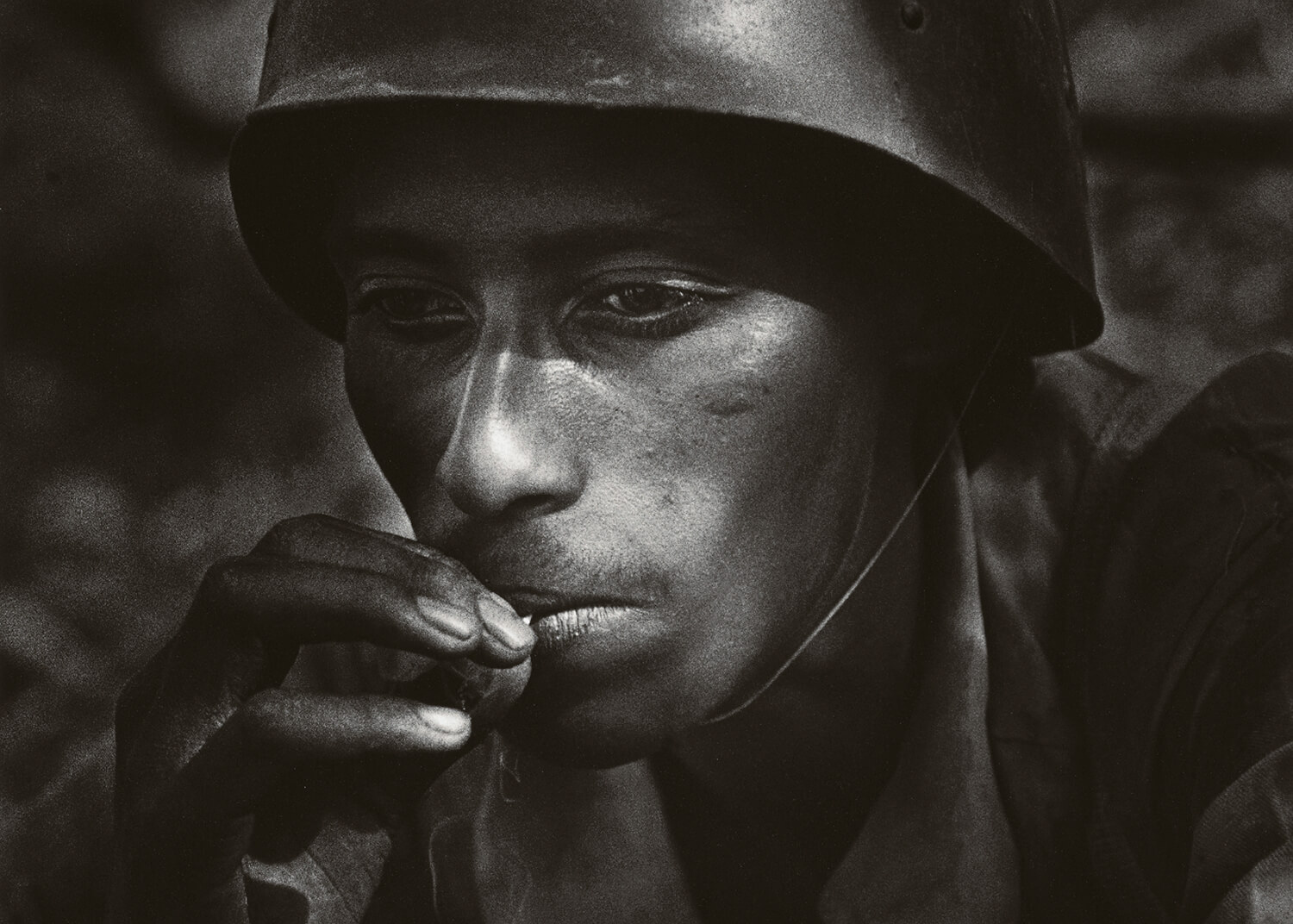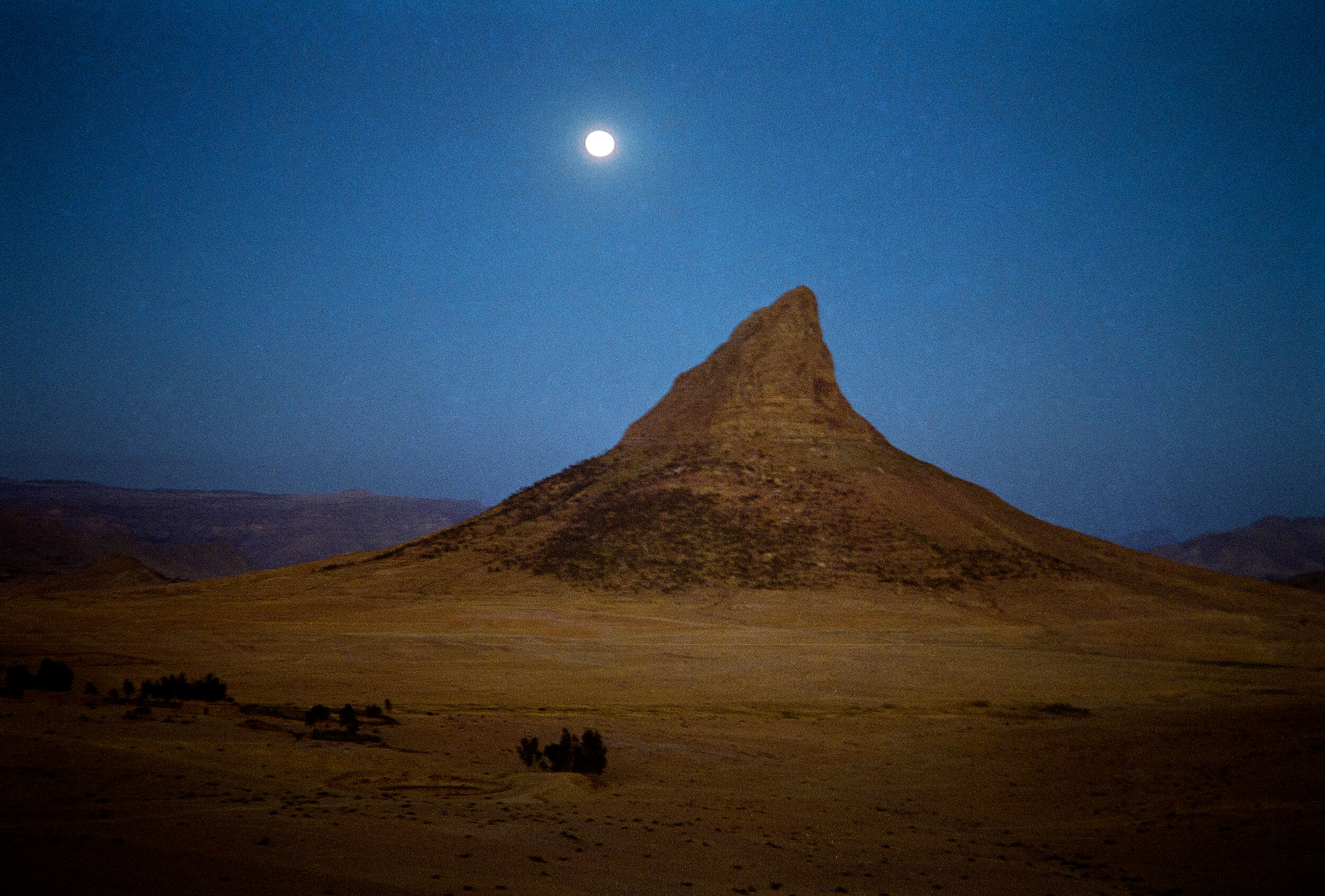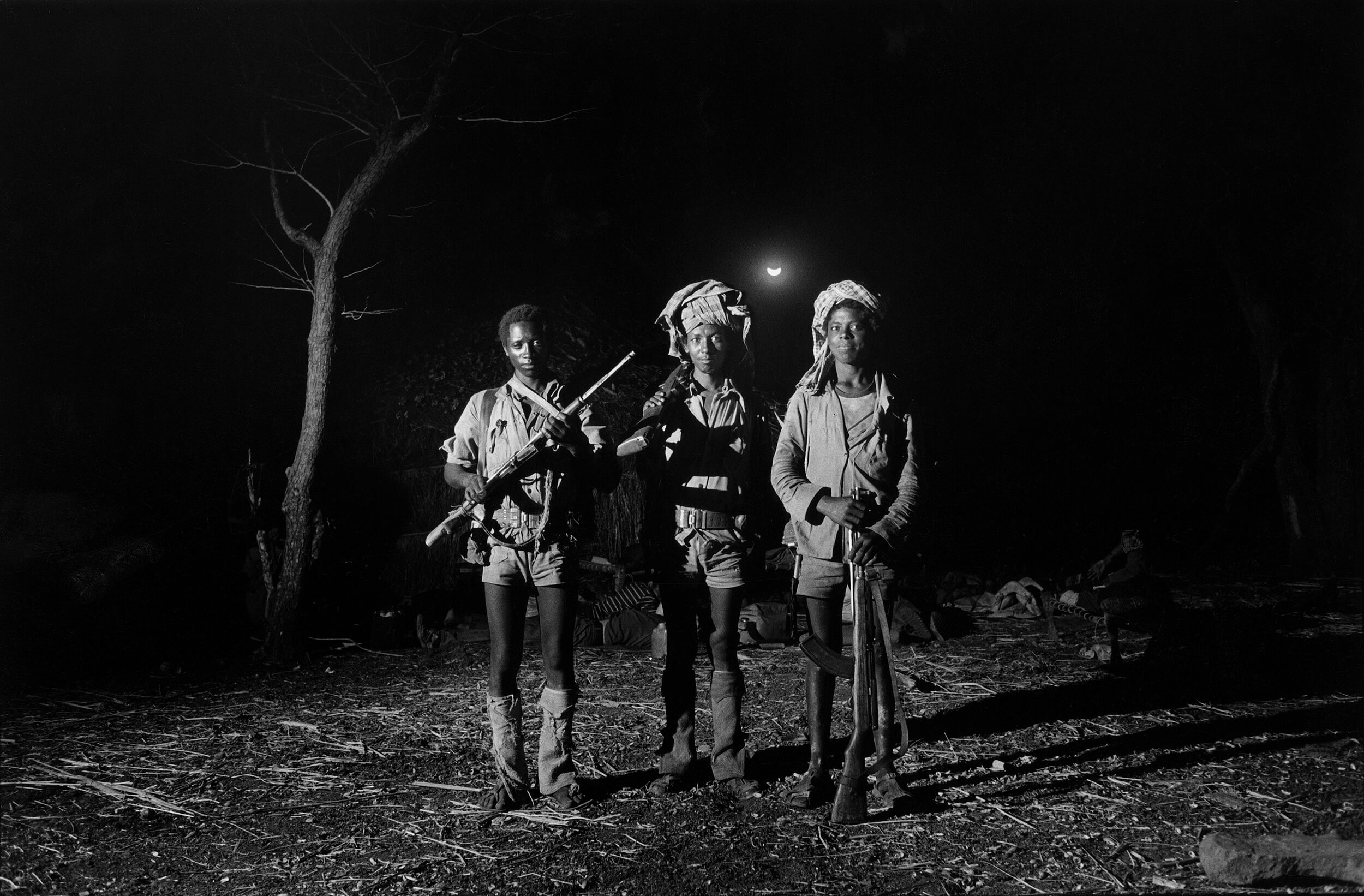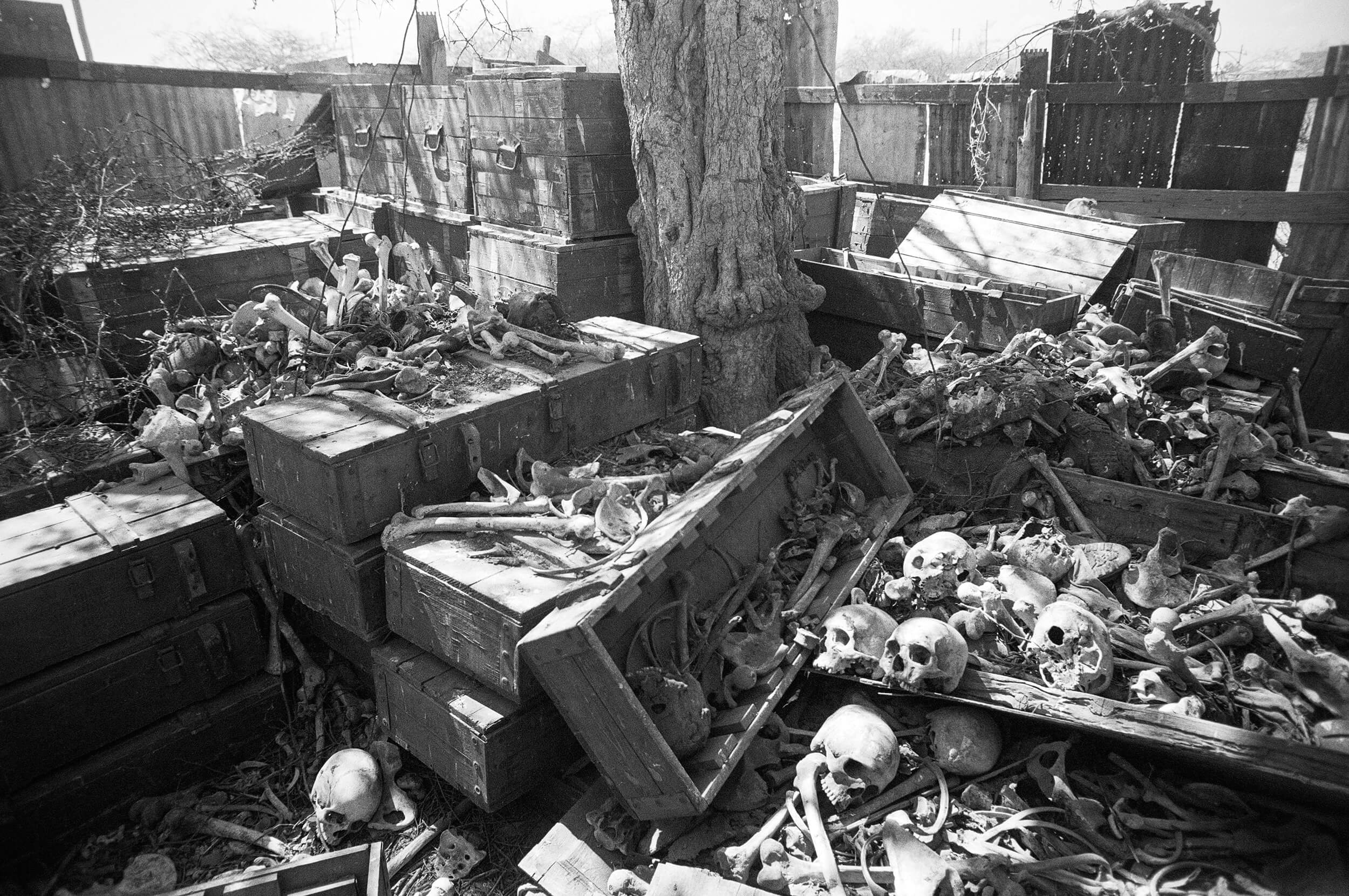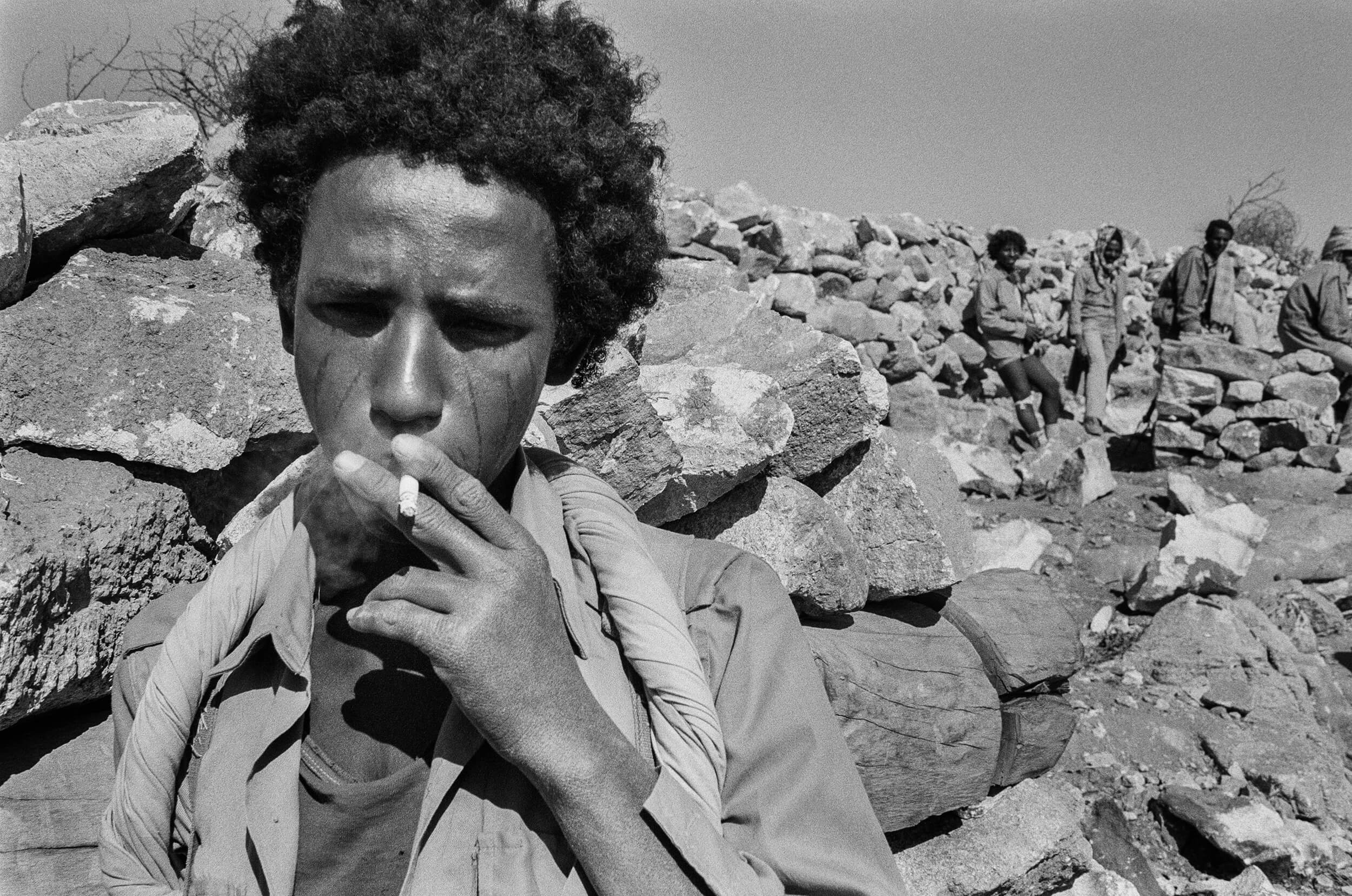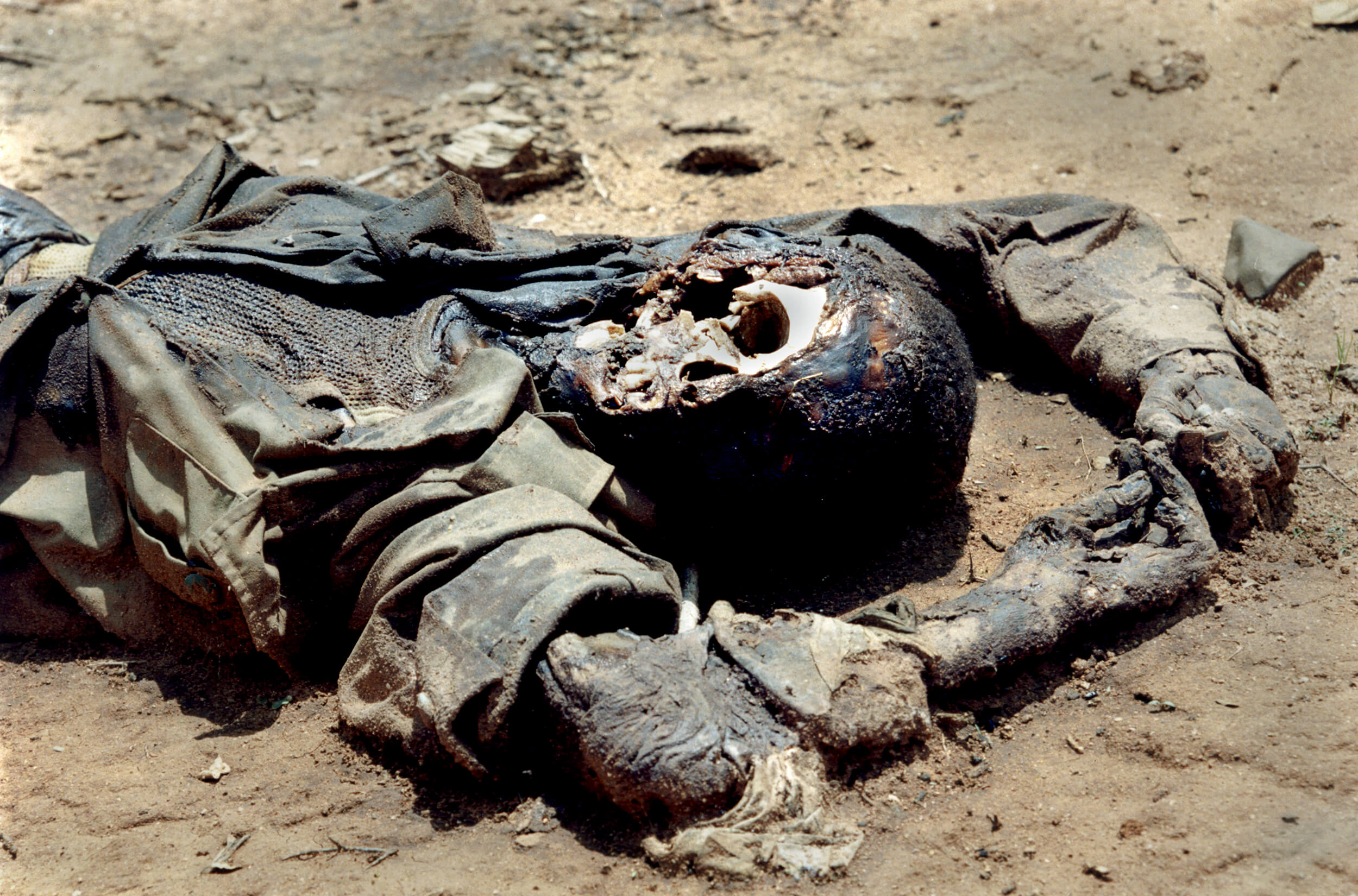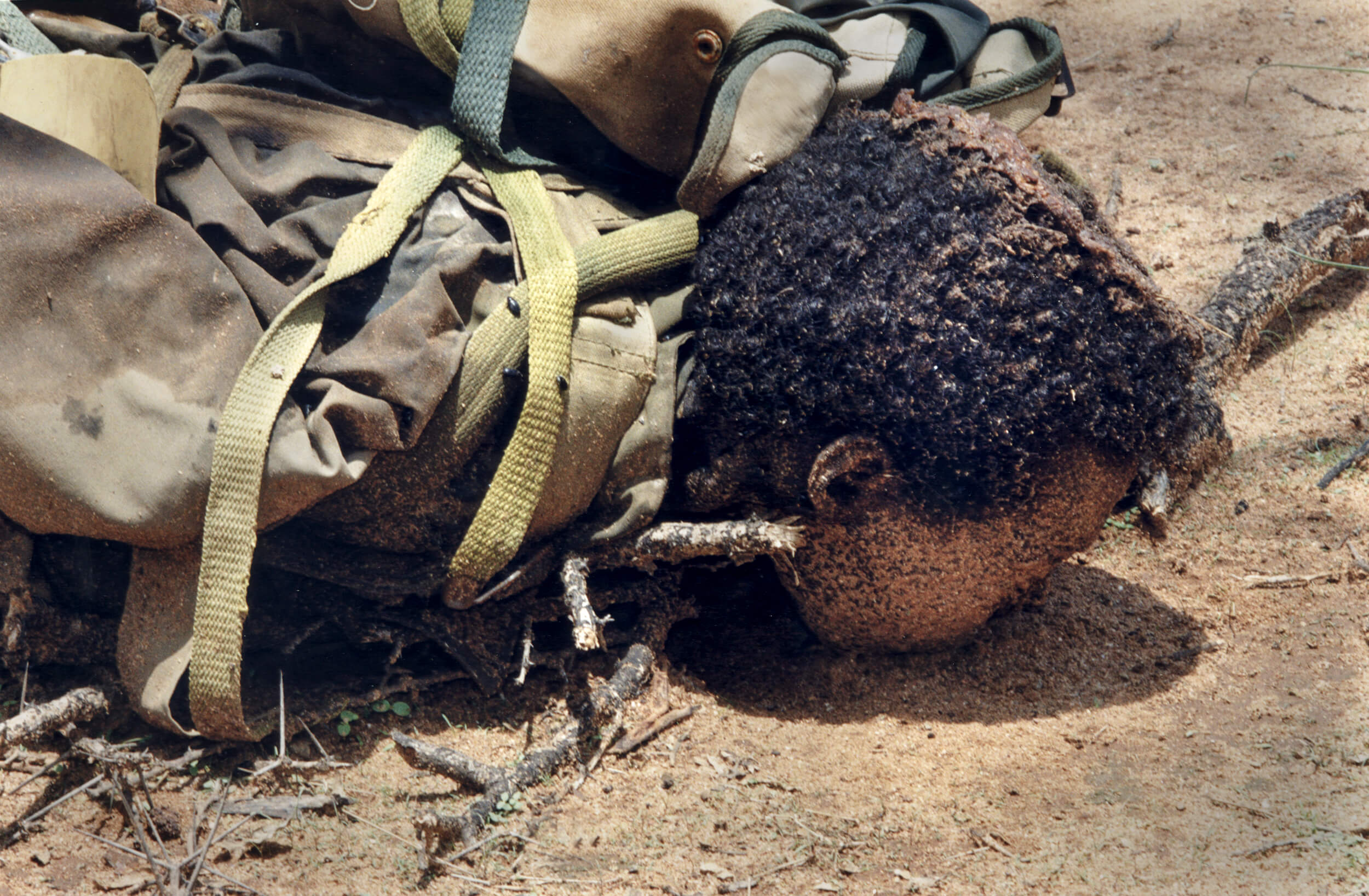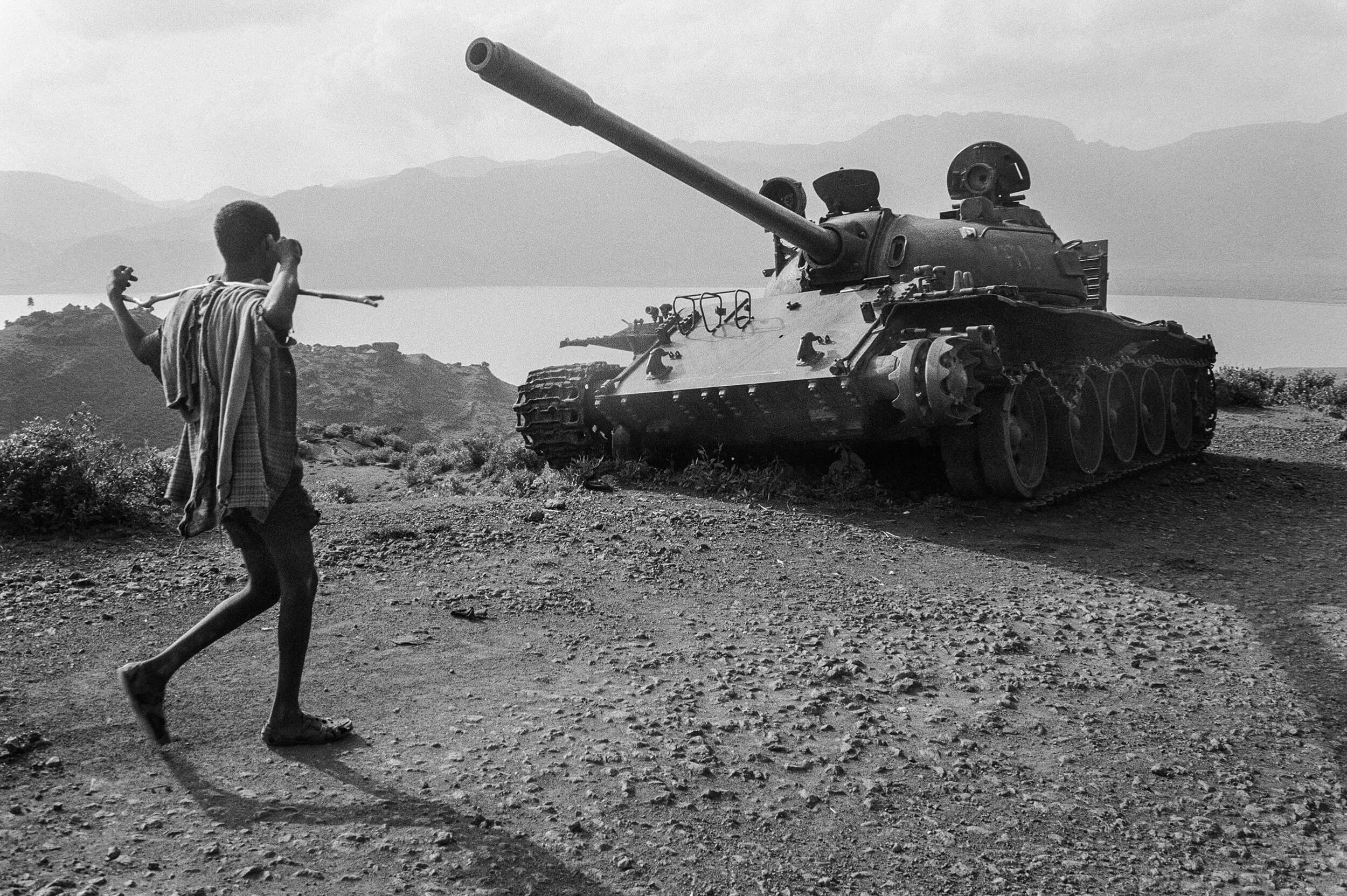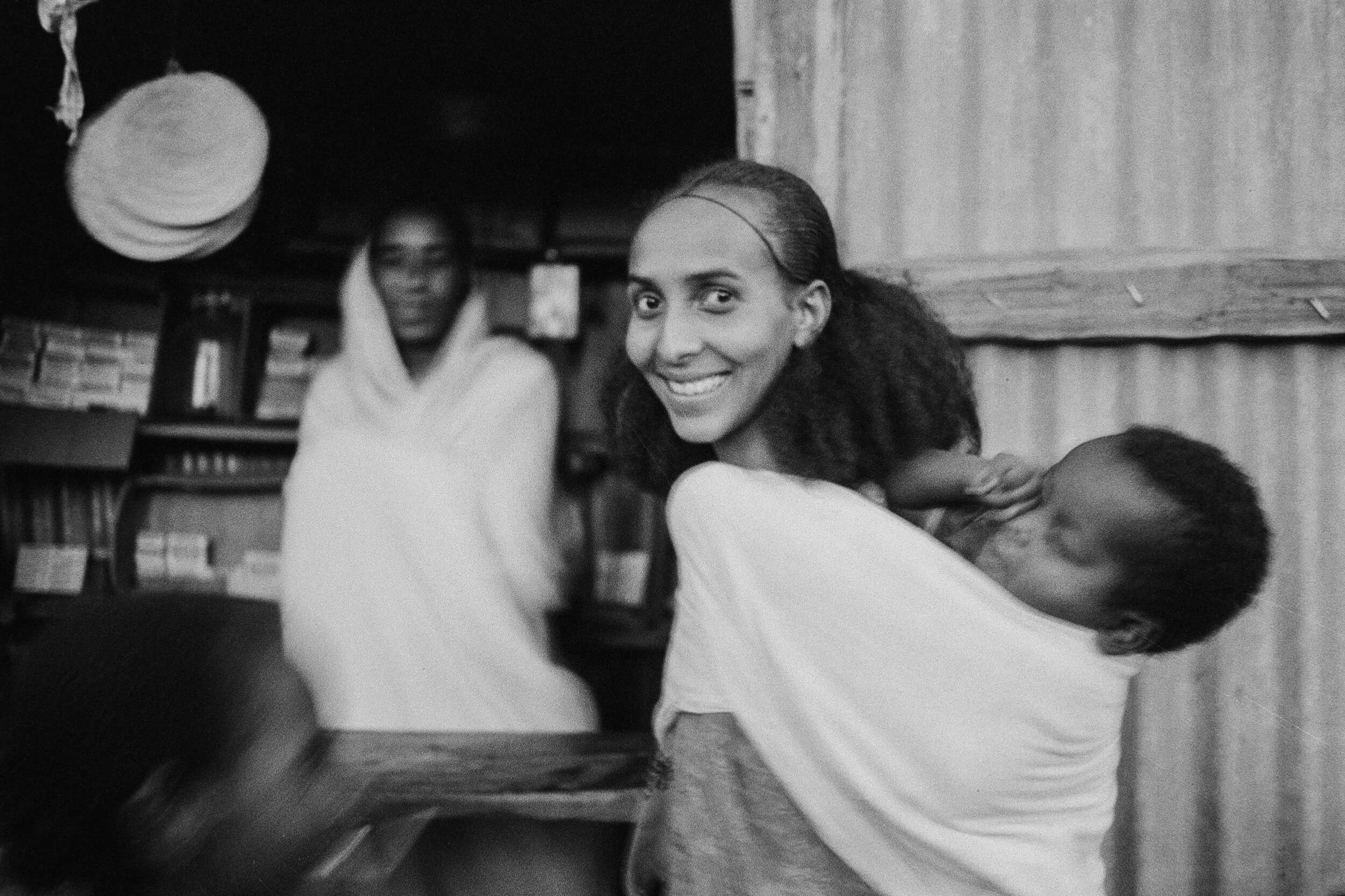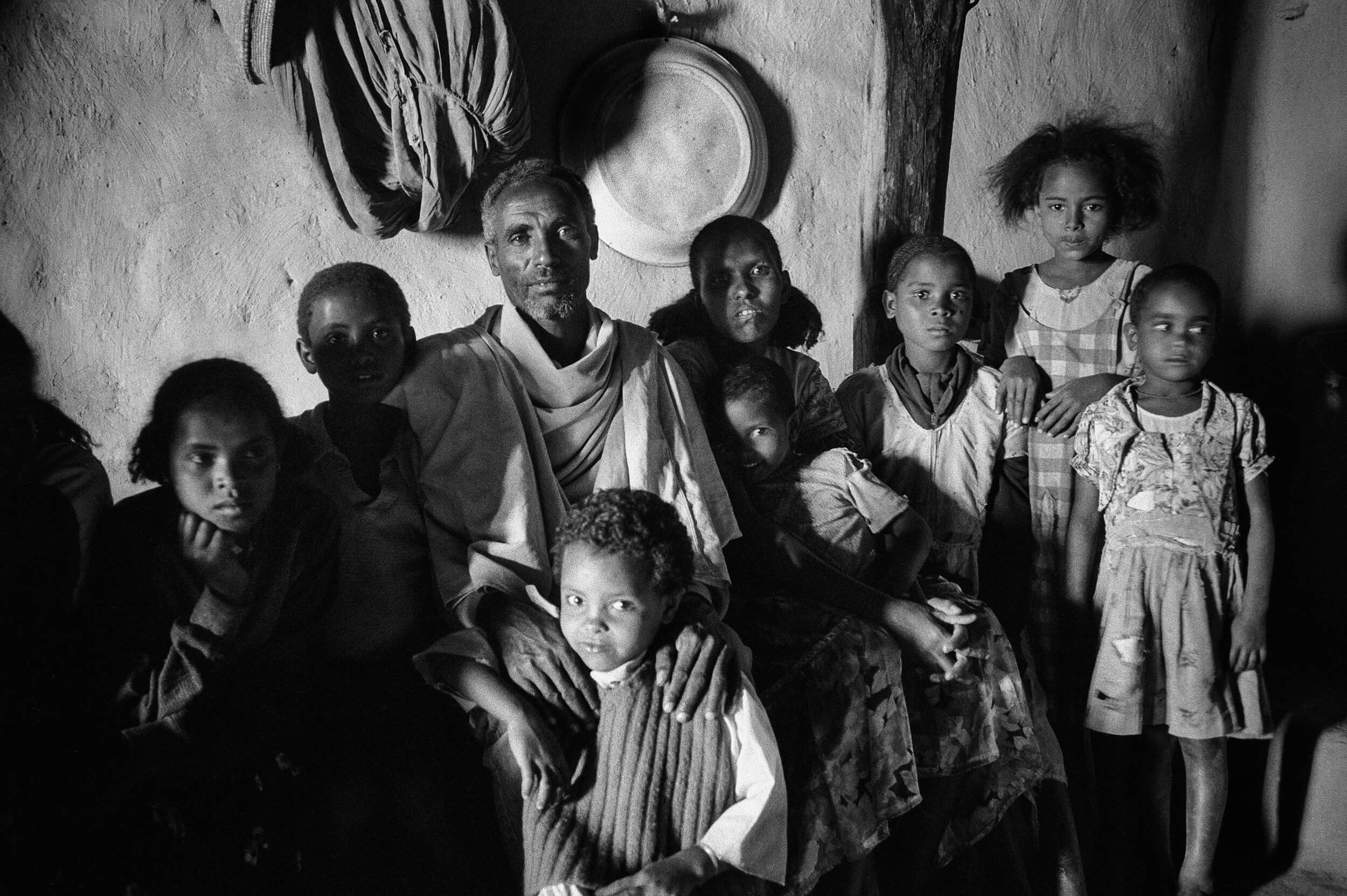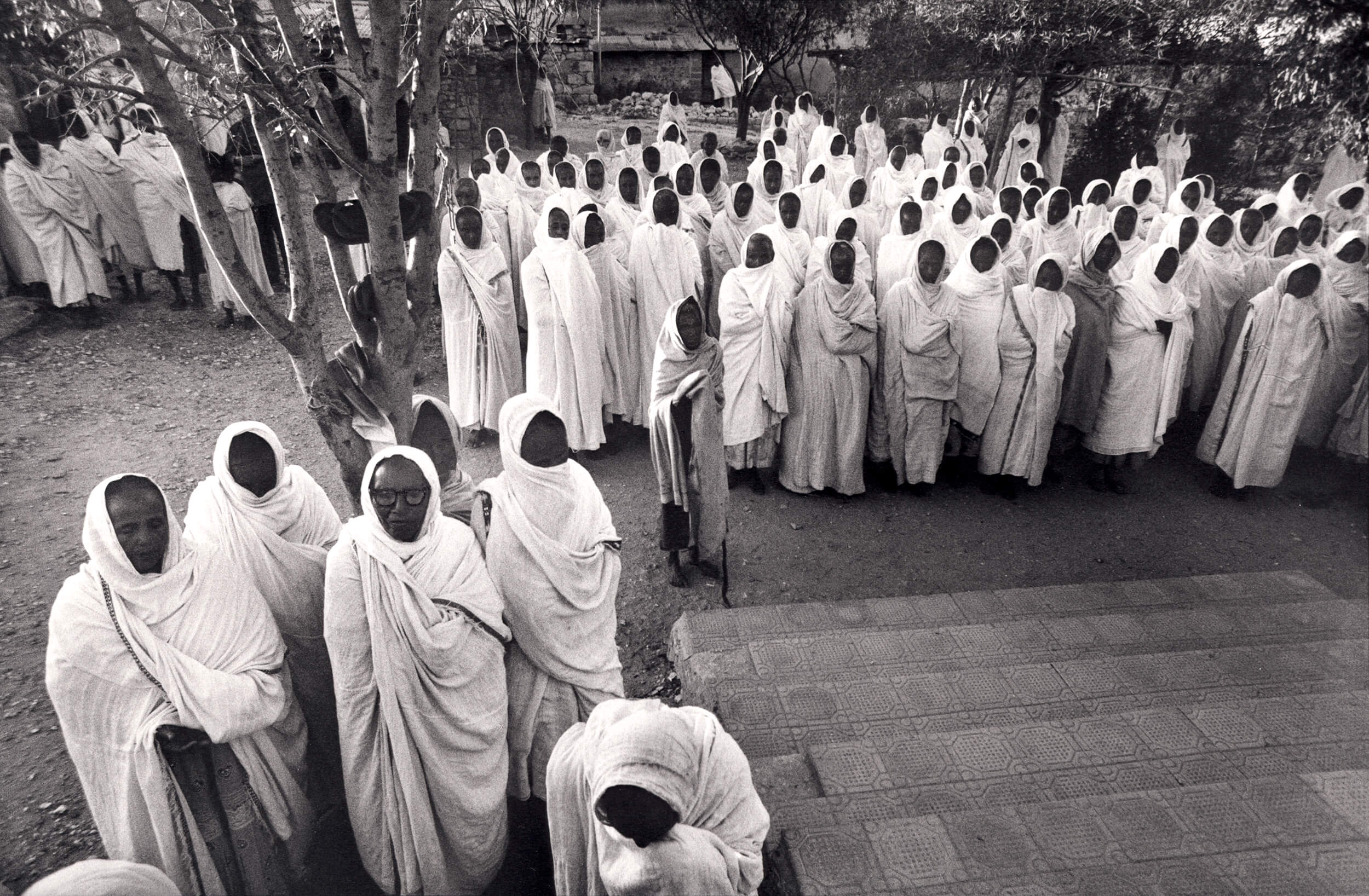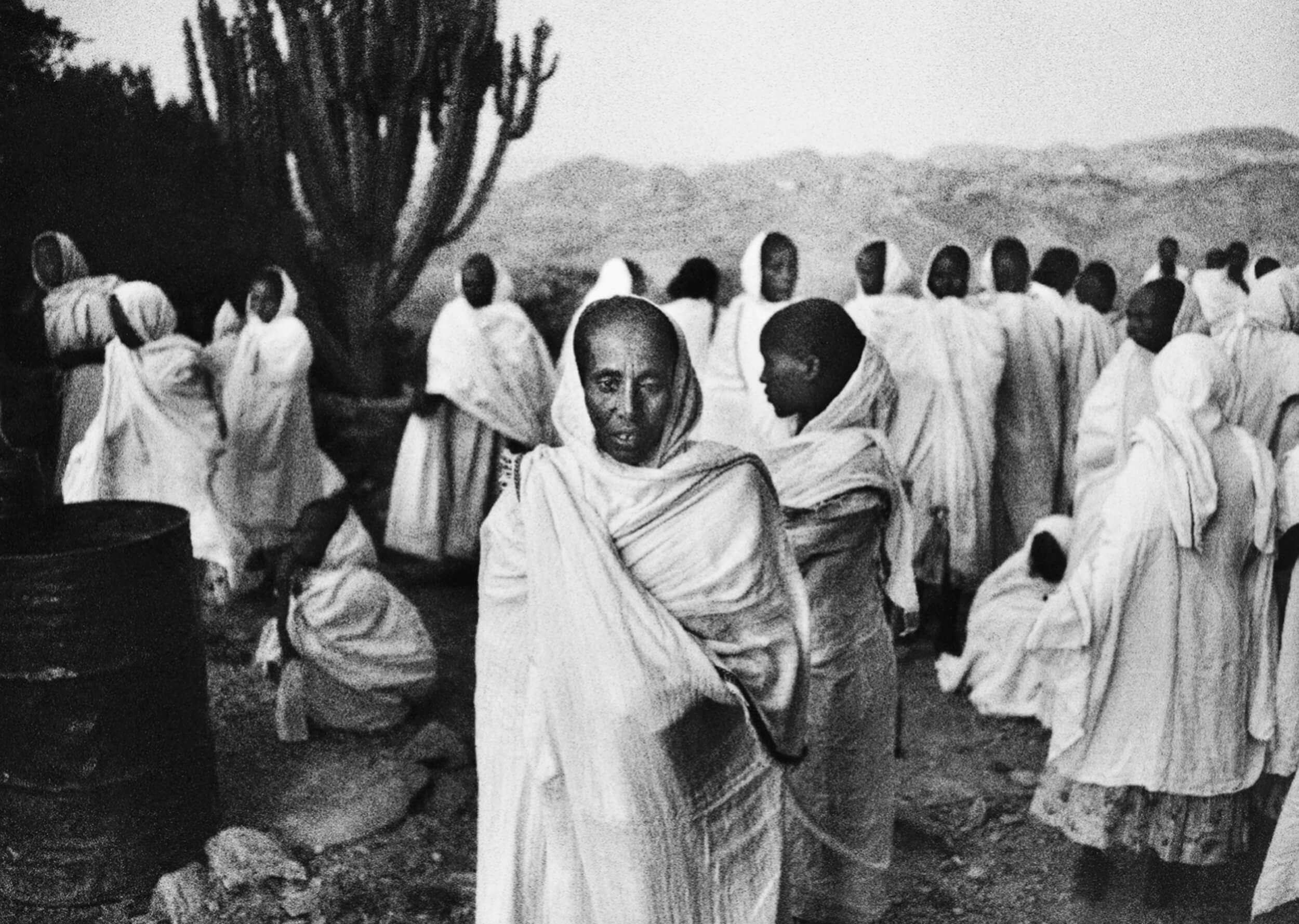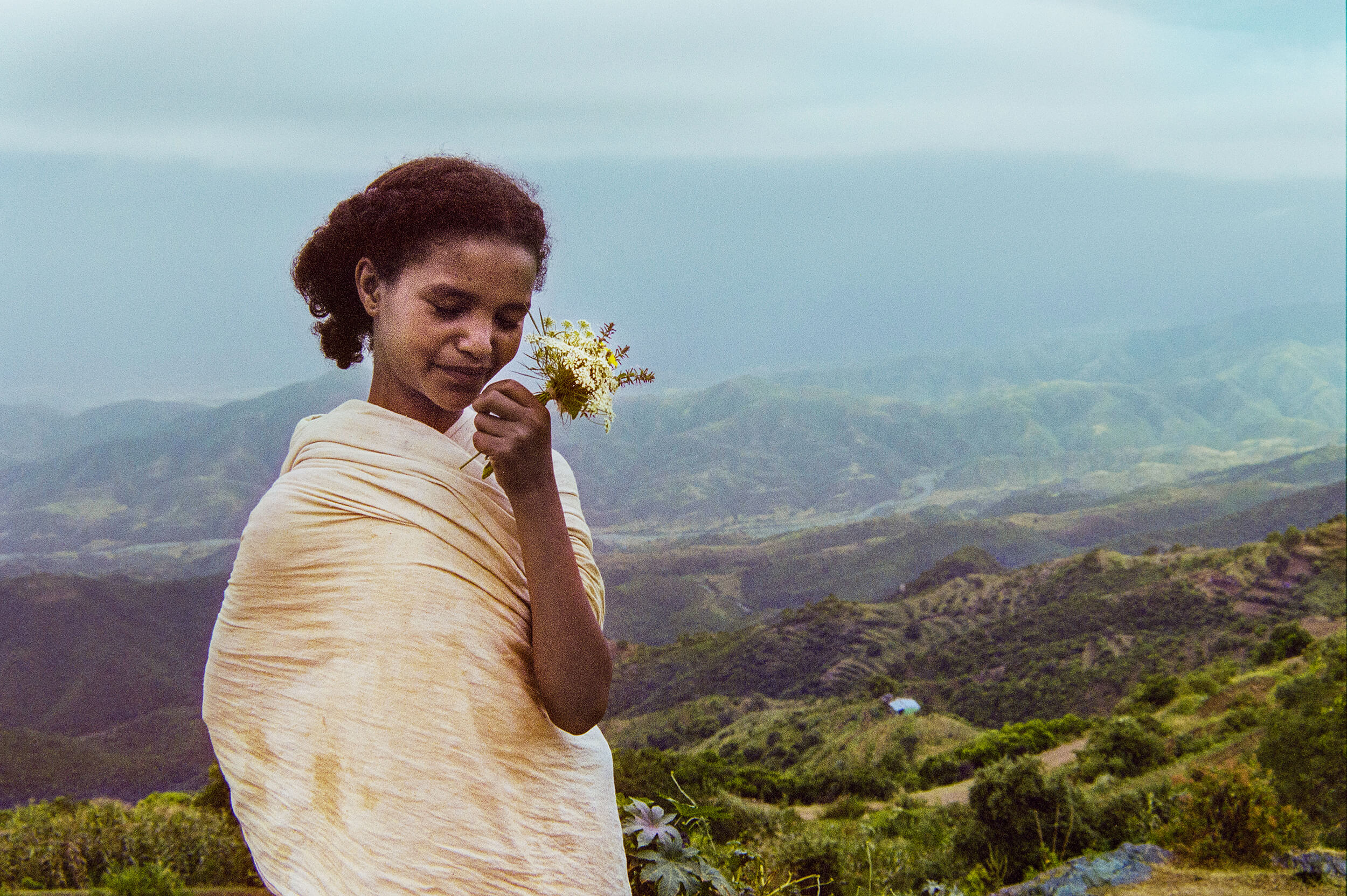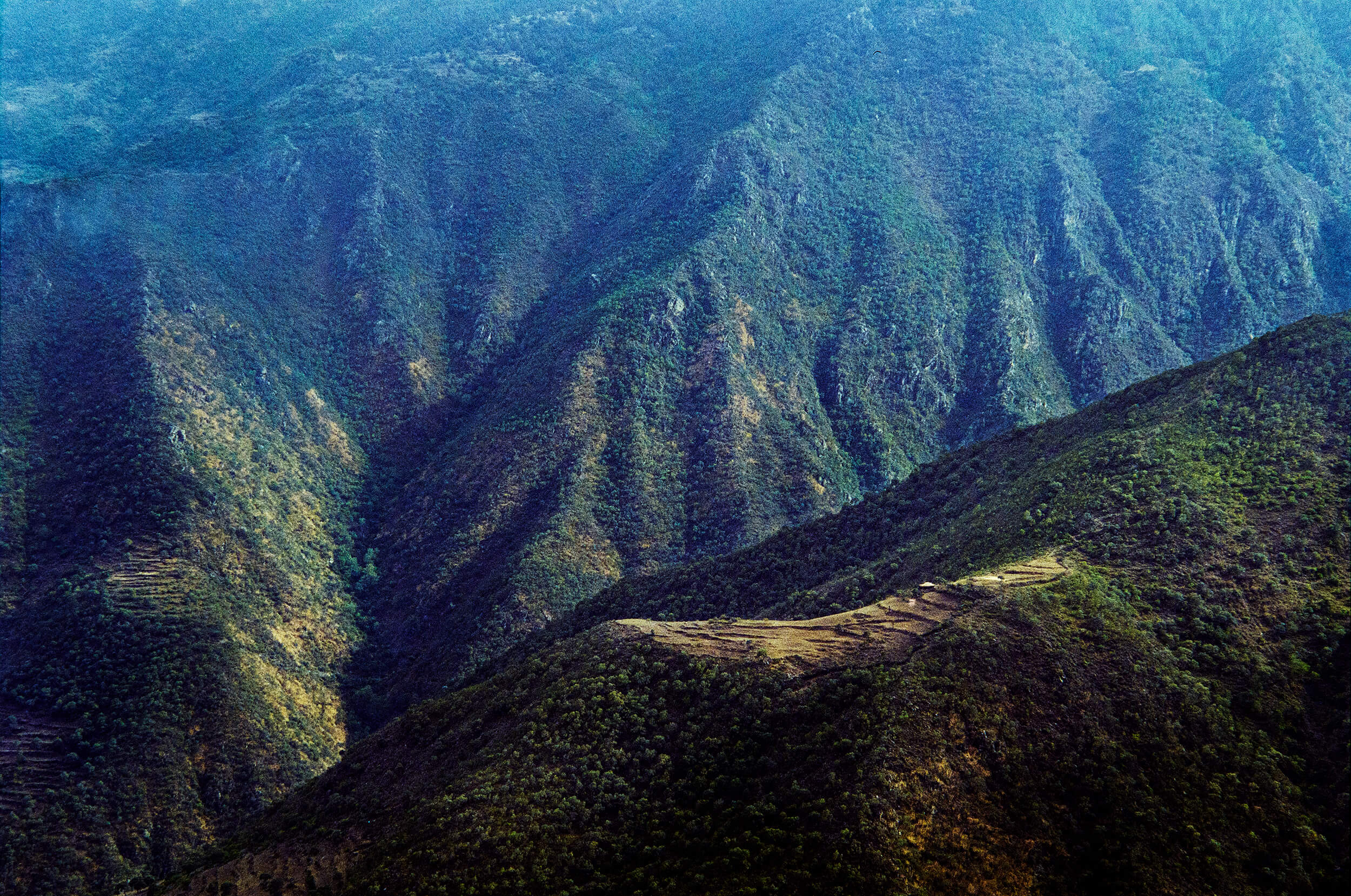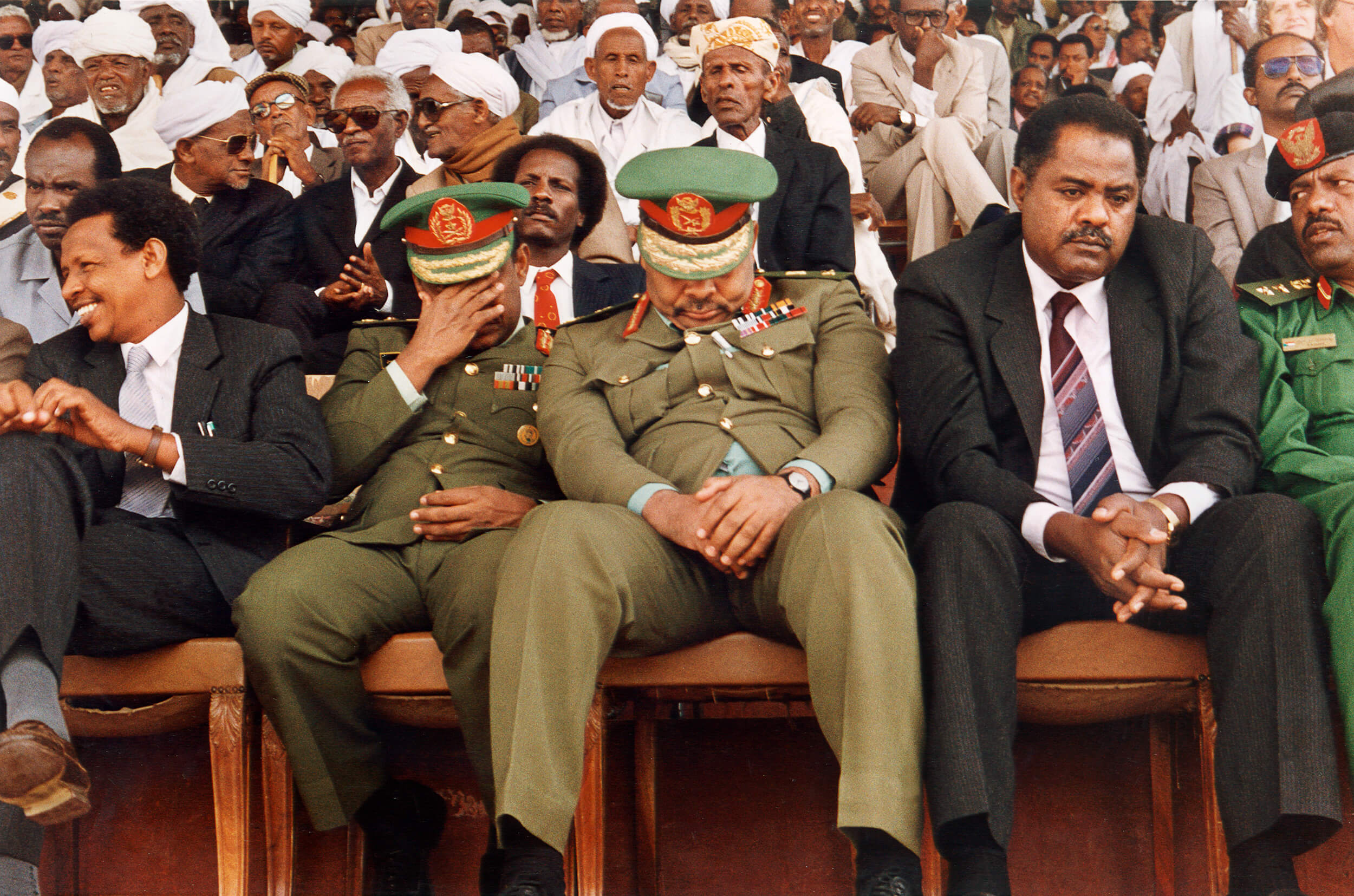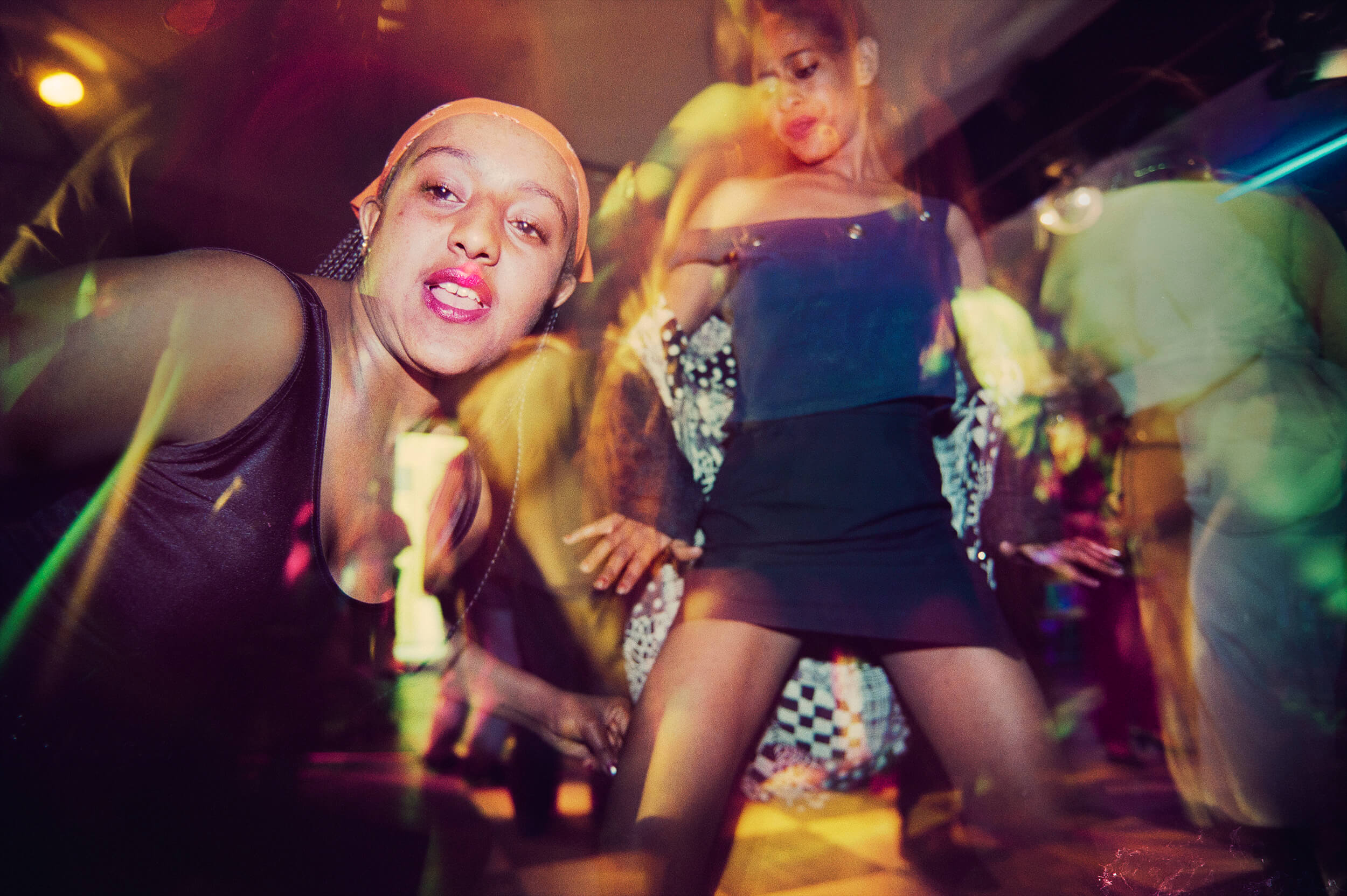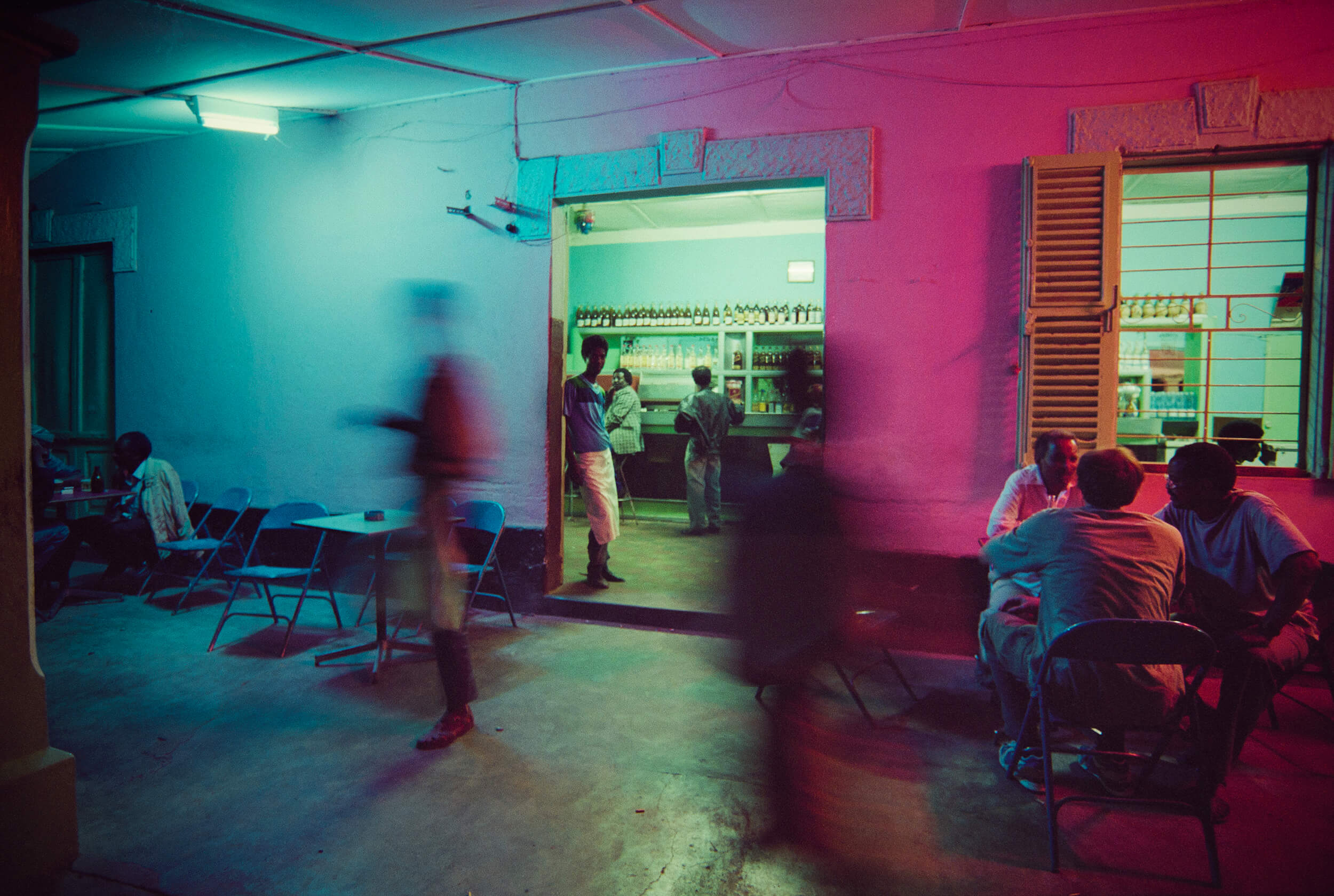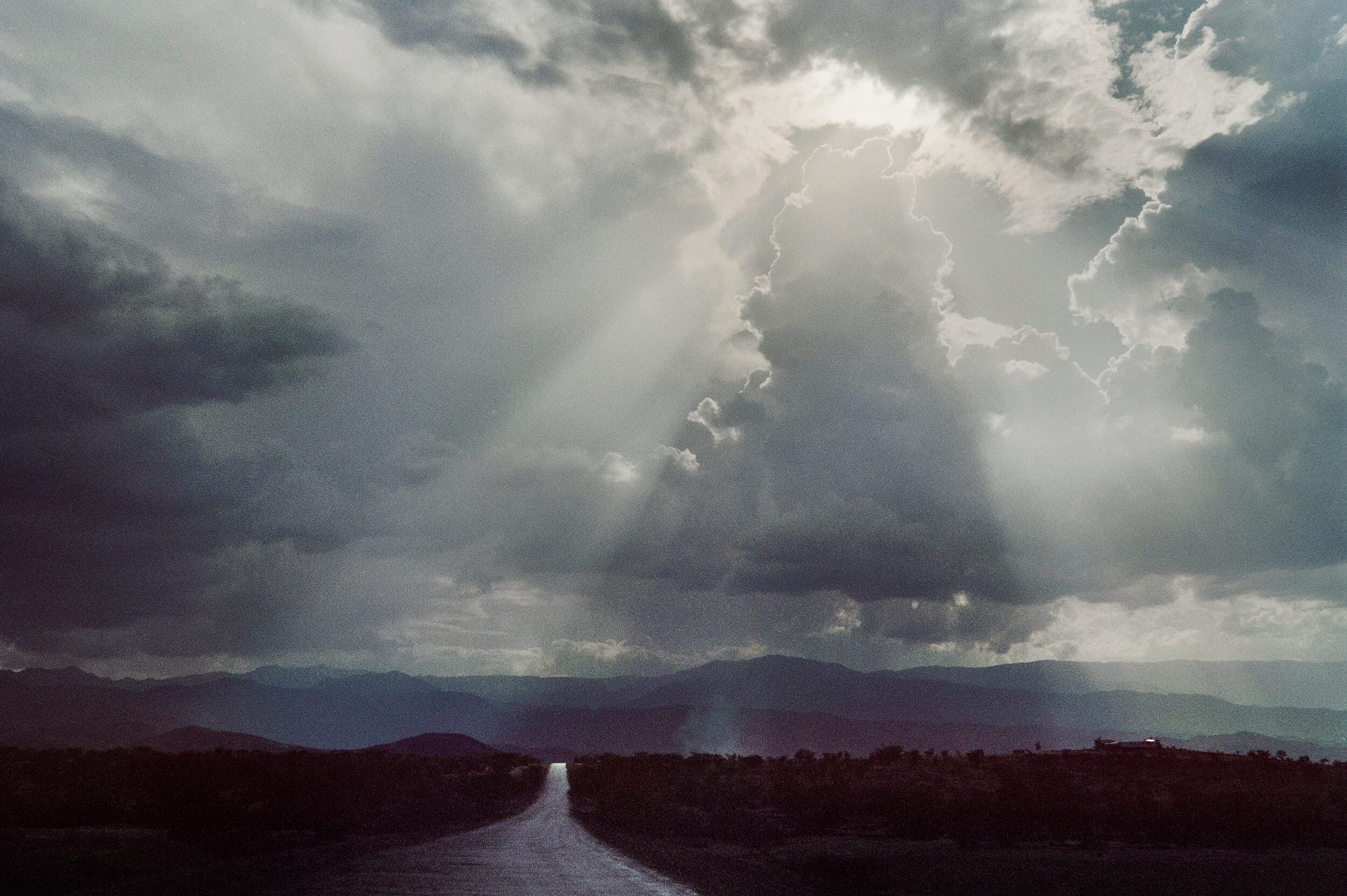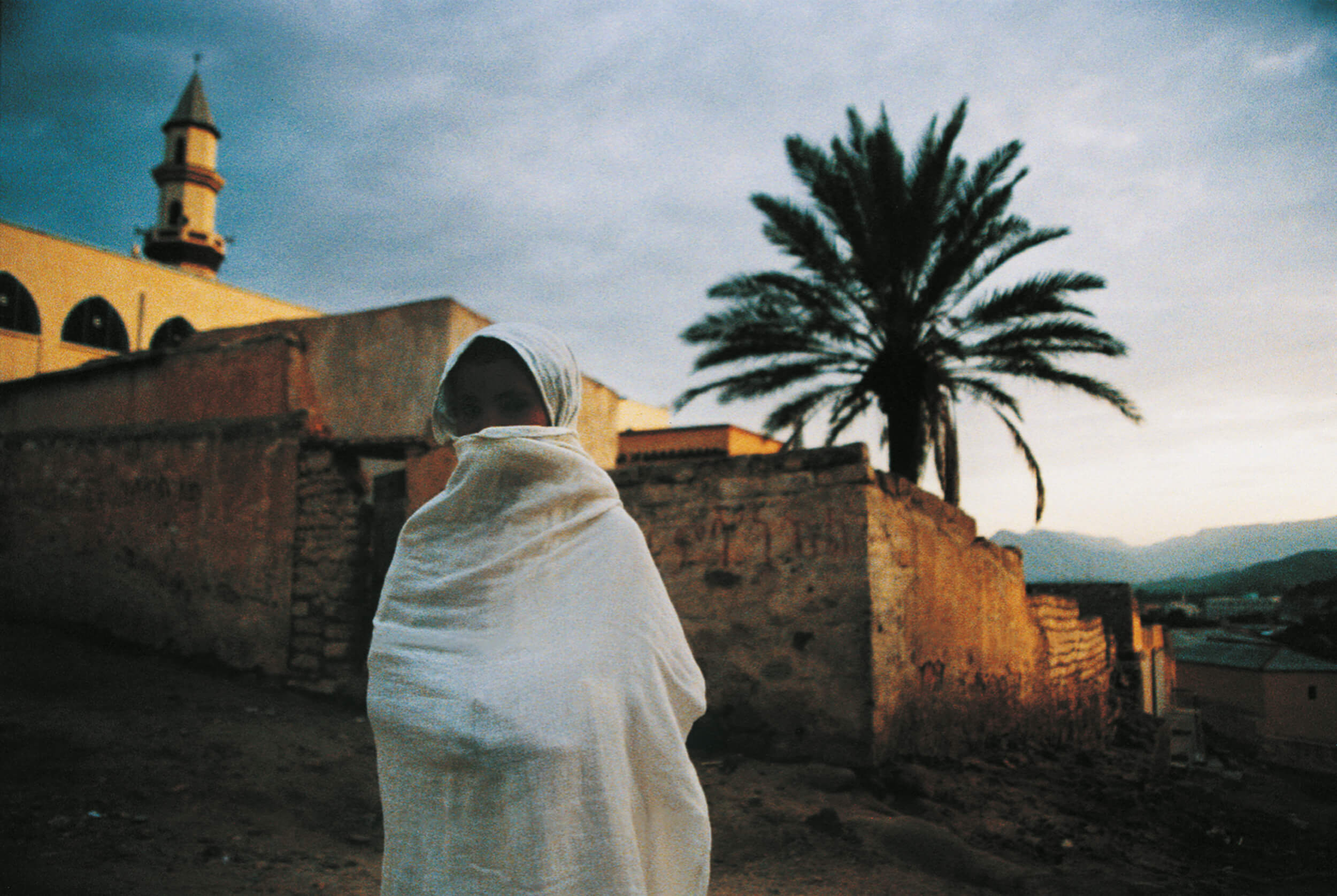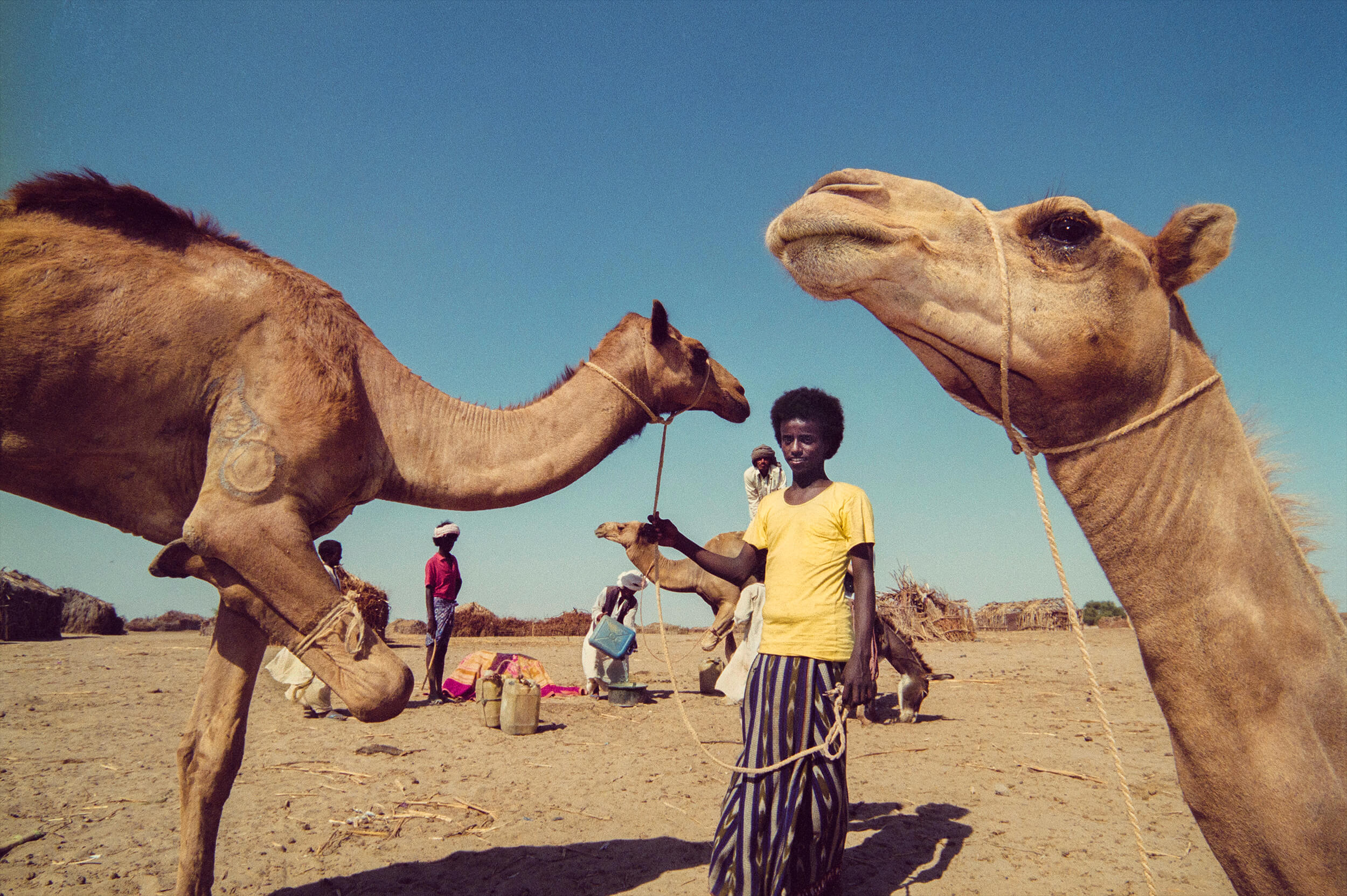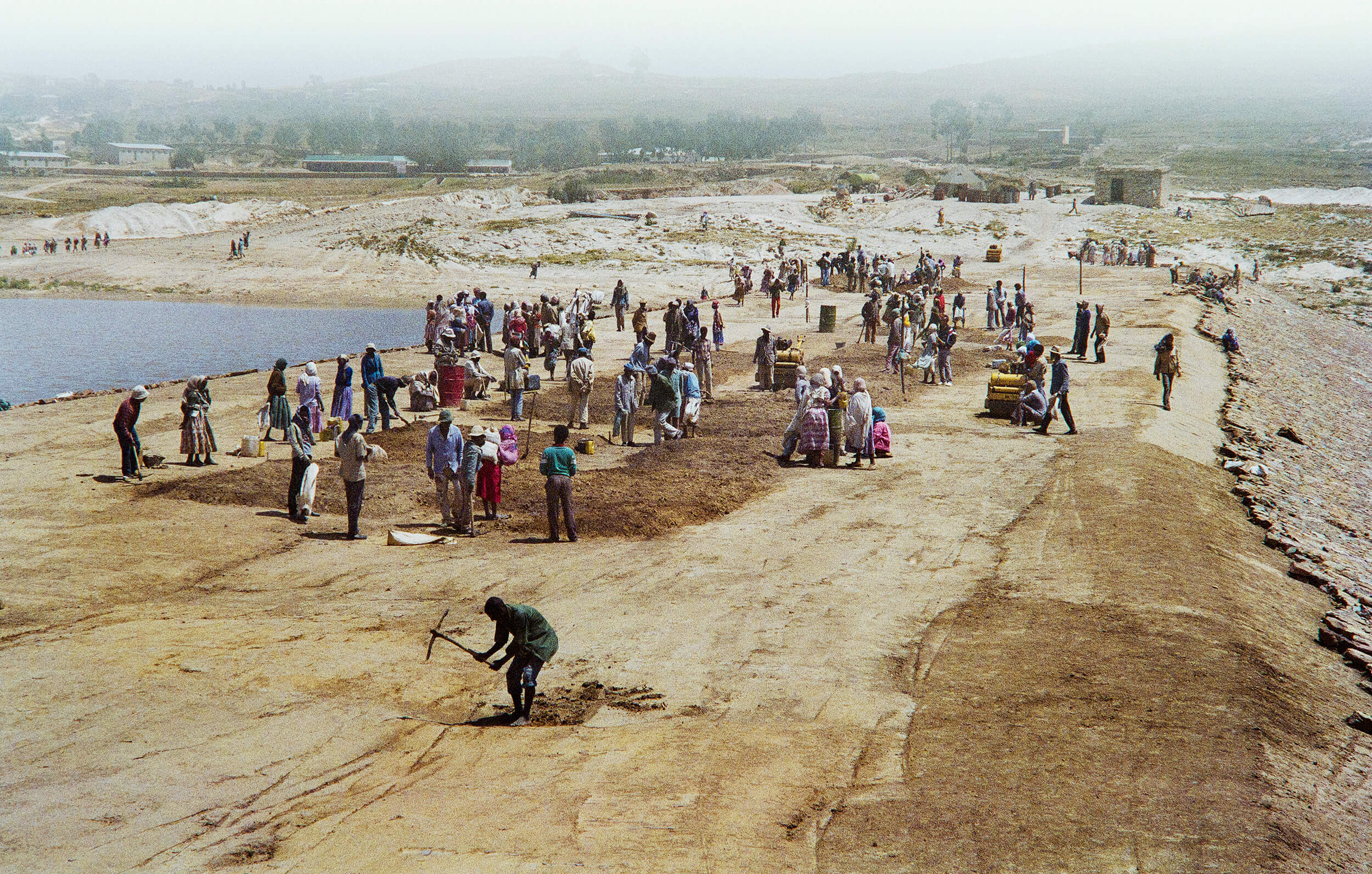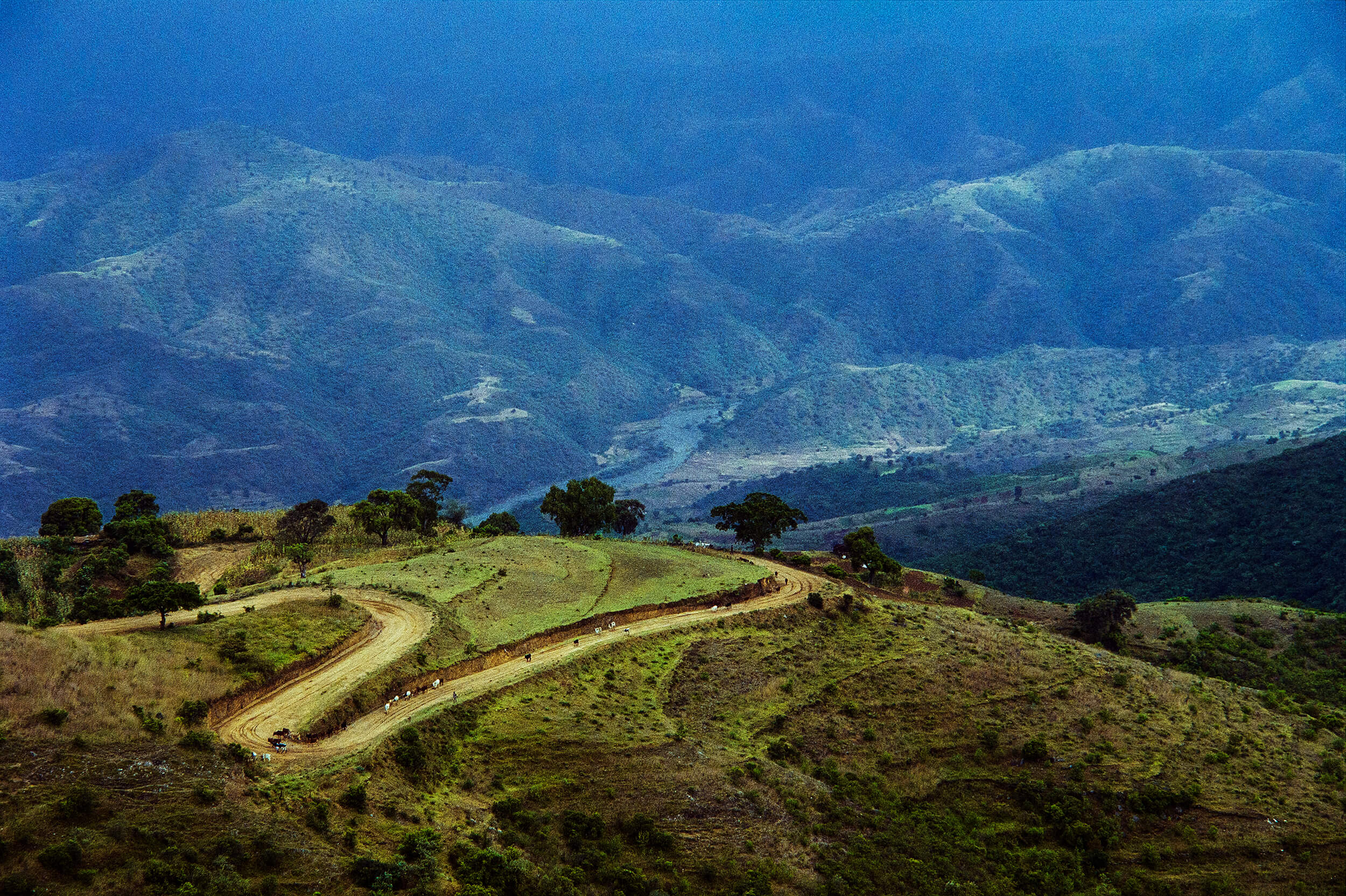Eritrea
Eritrea
Reporting for Swedish TV4 from the Badme front, Eritrea
At dawn after a few weeks of traveling we finally approached the Decamhare front in Eritrea. The very last front and the last trenches in the thirty-year long liberation war against Ethiopia. In this tense and war-worn situation, a silhouette of an old woman was revealed, only with some difficulties she moved forward. Her deformed back and fumble stick testified that she had lived a hard life. She seemed totally unconcerned of the war raging right behind her back, with positions only 70 meters between the Ethiopian and Eritrean trenches, blowing at each other from dawn to dusk. As she passed in front of me she stopped, and slowly turned her head towards me and said in Tigrinya, "Awet nehafash", “victory for the masses”. That's was all, she then continued her way in the mist.
The rays of the dawn shone quickly across the terrain and lit up the battlefields when the first Ethiopian MIG-fighters appeared in the sky as dark shadows from Mordor. An Antonov plan rumbled with his deadly bomb cargo when someone shouted that we had to throw ourselves on the ground and take protection. I stood a little bit too long shooting pictures of a fallen Ethiopian soldier without his lower part of the body, a life ended in total meaninglessness. I lost myself looking after his legs when they shouted stressfully at me to take protection. Remember I was hoping that the pilots had not seen me when I hide on the ground in the ditch. At that moment, I promised myself never ever take pictures of dead humans.
A few months later, the Eritrean soldiers surrounded the capital of Asmara, and the occupation soldiers fled. The thirty years of war and the 100 years of Italian and Ethiopian colonization were ultimately over for the people of Eritrea. They had accomplished their liberation by themselves, the price had been extremely high, but now the future was right there in their hands.
Sweden's relation to Eritrea is a long story. A story that begins with Sweden's first missionaries arriving with their ship to Eritrea's port city Massawa in 1866-, 24 years before Eritrea became an Italian colony. But the country has never really had support from Sweden, nor from the outside world either.
Eritreans are living with a sense that they always have been betrayed by the West. 1952, when the UN decided to create a federation between Eritrea and Ethiopia instead of holding the referendum as the Eritrean people claimed. In 1961, Haile Selassie was given carte blanche from the western countries to enter with his tanks and colonize Eritrea, and even today, the world allows Ethiopia to continue occupy parts of Eritrea.
Ethiopia became the first country to receive Swedish aid in the thirties, and became the Swedish baby in the Horn of Africa. The Swedish political leftwing of that time, were very loyal to Ethiopia due to the loyalty to the Soviet union, despite the illegally colonization of Eritrea.
Sweden as a nation was among the last to recognize Eritrea after the liberation in 1991 and the referendum in 1993. And there has never been any trade, business worth mentioning between our countries. The little aid transferred to Eritrea from Sweden disappeared when the Swedish/Eritrean citizen, Dawit Isaak, was detained.
Eritrea's liberation took place at the same time as President Mengistus dictatorship in Ethiopia became over thrown by forces from north Ethiopia, TPLF, in a coordinated action in May 1991, the Eritrea Liberation Movement EFLP Eritrea liberated Eritrea and it’s capital, while the Ethiopian Liberation Army TFLP, entered Addis Abbaba and replaced the leadership of Ethiopia. After thirty years of violent war and animosity, the two countries became friends, friends whose leaders were celebrated as new Nelson Mandelas. However, it did not take long until a number of factors became gravel in the peace machinery between Ethiopia and Eritrea again. The triggering factor for the war in May 1998 was that Ethiopia refused to return the small Eritrean town of Badme, and in 1997 began to print new maps in which considerable parts of Eritrea's territory had been transposed to Ethiopia.
The UN border commission gave Eritrea right concerning the border dispute. However, Ethiopia, that had already signed the agreement to acknowledge the decision from the UN commission, afterwards refused to carry out its commitments and continued to occupy parts of Eritrea’s territory.
In the 1990s, the country went through a process of democratization, a democratic constitution was written, press freedom began to evolve, Dawit Isaak was a co-worker and eventually a co-owner of the Setit newspaper, an independent voice among others. Simultaneously with the war against Ethiopia in 1998 all democratization ceased, the constitution was set aside, the newspapers were closed, and the announced election was suspended. 70 people were detained in august 2001, politicians, journalists and officers from the army among others that were considered opposition.
Today there is no war and no peace between the countries. A considerable number of the Eritrean population is standing as soldiers along the 80-kilometer-long border, due to the US backed Ethiopian occupation of Eritrean land. Consequently, a considerable amount of the already weak economy is allocated to the defense budget. Eritrea is a country that has recently been described as a country having had 17 percent growth recently, but growth from nothing is always high. There is gold in Eritrea, which many foreign companies are participating in the recovery off and offshore the Eritrean coast there is oil of high quality. However, Eritrea does not have the resources to start the oil extraction, and an attempt to make an agreement with the US and Germany regarding the oil has gone into the run. The fact that Eritrea has refused to submit to the US demands is one of the reasons for American demonizing of Eritrea as one of the world's hardest dictatorship.
Eritrea has an uncompromising attitude towards all forms of neo-colonialism. All forms of trying to decide over Eritrea, or pushing them towards certain decisions are not possible with this generation of leadership in Eritrea.
Swedish governments used to have the strategy and tactics to threaten Eritrea to release Dawit Isaak. That model failed during 13 long years. According to Eritrean leaders, the relationship between the countries was severely damaged during that period and directly affected the release of Dawit.
When Dawit Isaak will walk on the street as a free man is the day when it’s a decision from Eritrea without any interference from outside whatsoever.
When I meet with the Eritrean minister of justice in May 2016 in the capital Asmara I could see the possibilities opens for such a solution when she showed me the outline of the new law. In the new law-system the maximum punishment for the kind of crime the government accuse him for is 16 years.
This text about Eritrea will be updated when appropriate.
ERITREA
Population 2012 6 131 000
Official languages Tigrinya, Arabic and English.
Government form Single Party – the only party allowed is the People's Front for Democracy
and justice (PFDJ)
1890 Eritrea is formed by the Italian colonial power
1896 The famous battle of Adowa, which Italy loses against Ethiopia failed to colonize Ethiopia as well.
1941 After 52 years as an Italian colony, the Italian army is defeated by Britain. Eritrea is now administered by the British Army.
1952 The British administration leaves its power in Eritrea to the UN, which, against the will of the Eritreans, decides that the country will be part of a federation with Ethiopia. Eritreans want a referendum. Eritrea thus does not get the independence the country was aiming for, but got at least some democratic rights and some autonomy.
1960 The Eritrean flag is prohibited.
1961 Eritrea begins the thirty-year liberation war in Ethiopia. After growing tensions and dissatisfaction between Ethiopian power and Eritrean separatists, a war between them breaks out. During the war, which lasts for 30 years, both the Eritrean Liberation Front (ELF) and the Eritrean People's Liberation Front (EPLF) are formed.
1962 Ethiopian emperor Haile Selassie dissolves the federation and Eritrea's parliament. The rest of the world allows Ethiopia to colonize Eritrea without any protests.
1974 In a coup, Haile Selassie is overthrown and replaced by the Marxist junta the Derg. At the same time, the ELF and the groups that later formed the EPLF, cooperating after fighting each other for several years.
1991 EPLF liberate Eritrea. The fall of the Soviet state has weakened Ethiopia, which for decades received its military support from the Warsaw Covenant. In May, the Ethiopian Liberation Movement TPLF, capture the capital Addis Ababa, and the dictatorship leader Mengistu Haile Mariam escape to Zimbabwe, while EPLF liberate Eritrea's capital Asmara. Cease fire is introduced after peace talks in Washington and London. EPLF, headed by Isaias Afewerki, establishes a provisional government.
1993 A referendum is held on independence. More then 99 percent of the Eritreans vote for autonomy and Afewerki is appointed president.
1996 A constitution is written and ratified, but has not yet been implemented. New press freedom laws make it possible to establish independent newspapers.
1998 A border conflict between Eritrea and Ethiopia leads to another war between them breaks out.
2000 A ceasefire is negotiated. One of the conditions means that the UN establish a peace-keeping security zone at the border area of ritrea, with 4,000 UN soldiers.
2001 In an open letter, 15 members of the PFDJ party (the political party formed by EPLF) criticize Isaias Afewerki's way of managing the democratization process and controlling the country. The criticism is published on the internet and, a few months later, even in it free press – among other things in Dawit Isaac's newspaper Setit. In September, Dawit Isaak and 70 other opposition arrested without trial.

